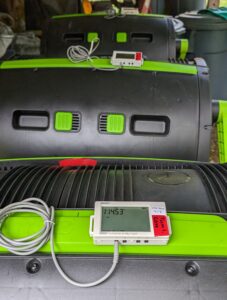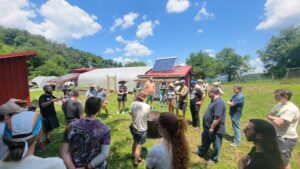Direct solar PV hot water for hydroponic system
Nexus designed a direct solar PV water heating system using the existing PV array installed in the greenhouse. The original system included eight 195W panels wired into four sets in parallel and two in series, forming one array. We reconfigured the system into two identical arrays to compare their power production with and without a maximum power point tracker (MPPT) and connected them to heating elements in a hydroponic water storage system. The MPPT finds the exact maximum power point, adjusts the impedance accordingly, and adapts to the actual conditions of the PV array. During the cold season, we will collect voltage and current data through a data logging system and analyze power production.
Figure 1. Data logging system and PV array junction box for Direct solar PV hot water
Co-composted biochar (COMBI) study
We have started research on applying biochar to soil with the support of the Sustainable Agriculture Research and Education (SARE) on-farm research program. This research aims to find an optimal compost-biochar recipe through a series of experiments and to create a user manual that is easy for local farmers to understand and apply. In particular, this study anticipates synergistic effects through co-composting, which incorporates biochar from the beginning of the composting process.
Biochar’s high surface area and porosity create an environment that enhances the diversity and activity of microorganisms, acting as a buffer against external environmental changes, thus improving the humification process. Its high water-holding capacity helps maintain stable moisture content. The heat generated during the composting process increases the oxidation of the biochar surface, enhancing biochar’s capacity for the adsorption of nutrients, minerals, and dissolved organic materials.
In the first series of experiments, which started in the summer, the temperature in the biochar co-composting pile reached its peak quickly and demonstrated more stable behavior under external environmental changes, such as temperature fluctuations, watering, and turning. This fall, we will conduct plant growth experiments following COMBI sample analysis.

Figure 2. Three compost tumblers (Compost only; COMBI 10% biochar; COMBI 5% biochar)
New courses with Nexus
Two courses have been developed utilizing research and resources from the Nexus.
Biochar Technologies
Biochar provides an opportunity to turn waste wood and crop residues into a powerful soil conditioner, helping regenerate healthy, resilient soil while sequestering carbon. Biochar Technologies focuses on how biochar is made and used, how it impacts soil regeneration, and how it connects to business, policy, and climate change mitigation. This course includes traditional classroom instruction as well as hands-on labs and field work.
Greenhouse & CEA Technologies
Declining water availability and erratic temperature patterns are pushing farmers and growers to increasingly adopt protective environments to grow perishable crops. A surging demand for fresh food amid shrinking arable land caused by urbanization, industrialization, and climate change are additional technology drivers. This course will focus on greenhouses within the larger context of controlled environment agriculture (CEA), an emerging type of hydroponically-based agriculture where plants grow within a controlled environment to optimize horticultural practices while minimizing water, arable land, and agrichemical use. Greenhouses can extend the growing season/allow for year-round growing conditions and are considered more energy efficient than their indoor counterparts due to the use of natural sunlight. Course topics include: greenhouse design, management, and performance using data collection and analysis from local case study greenhouses. CEA topics include hydroponics, nutrient management, and supplemental lighting systems. The course will include traditional classroom as well as lab and field work activities.
AT Program 40th anniversary visit to Nexus
This summer, App State’s Appropriate Technology Program celebrated its 40th anniversary. The event featured alumni panels, field trips to on- and off-campus active projects, and various social gatherings designed for networking and enjoyment. The Nexus hosted an off-campus field trip to over 30 attendees to showcase ongoing research initiatives.
For more stories about the Appropriate Technology Program, please visit here.

Figure 3. AT 40th anniversary at the Nexus
Upcoming workshop
This fall we are presenting a workshop through Patterson School Foundation’s USDA grant to Promote Beginning Farmers and Ranchers.
Efficient greenhouse heating technologies (November 17, 1-4pm): Farmers in Southern Appalachia often face challenges associated with terrain and climate such as a short growing season and size of farm, thus struggling to balance economic feasibility. Season extension with greenhouses is a key strategy to increase access to locally grown produce and farmers’ profits in the region, but the high energy costs of conventional greenhouse heating exclude many rural farmers from being able to afford heated greenhouses. An affordable greenhouse heating system designed and installed by the Nexus research team addresses this challenge and has helped the partner farm (Springhouse farm in Vilas, NC) cut propane use in half. This workshop will provide field trips to efficient greenhouse heating systems installed on local farms: Springhouse farm (bench-top root zone heating), Nexus greenhouse (solar heated hydroponic), and Against the Grain Farm (biochar kiln heat recovery). Participants will see firsthand the different types of sustainable greenhouse heating technologies and learn how they work efficiently.
Case study on Nexus heating system published in journal
A paper has been published detailing an efficient greenhouse heating system that integrates renewable energy with root zone heating (RZH) technology, as part of a collaborative research initiative of the Nexus project. The study, which analyzed data spanning five years from 2018 to 2022, investigates the energy savings and microclimate control effects of the Nexus heating system installed at Springhouse Farm in North Carolina, USA. This research is particularly significant as it provides a long-term evaluation of RZH technology in a commercial greenhouse setting, with a focus on energy efficiency and adjustments based on varying weather conditions.
